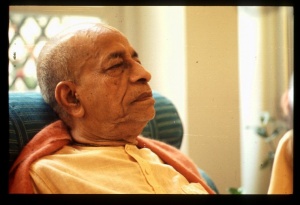SB 4.24.6: Difference between revisions
m (1 revision(s)) |
No edit summary |
||
| Line 1: | Line 1: | ||
{{info | {{info | ||
|speaker= | |speaker=Maitreya Ṛṣi | ||
|listener= | |listener=Vidura | ||
}} | }} | ||
[[Category:Srimad-Bhagavatam - Canto 04 Chapter 24|s06 ]] | |||
[[Category:Bhagavatam Verses Spoken by Maitreya Rsi - Vanisource|042406]] | |||
<div style="float:left">'''[[Srimad-Bhagavatam]] - [[SB 4|Fourth Canto]] - [[SB 4.24: Chanting the Song Sung by Lord Siva|Chapter 24: Chanting the Song Sung by Lord Śiva]]'''</div> | |||
<div style="float:right">[[File:Go-previous.png|link=SB 4.24.5]] '''[[SB 4.24.5]] - [[SB 4.24.7]]''' [[File:Go-next.png|link=SB 4.24.7]]</div> | |||
{{RandomImage}} | |||
==== TEXT 6 ==== | ==== TEXT 6 ==== | ||
<div | <div class="verse"> | ||
rājñāṁ vṛttiṁ karādāna- | :rājñāṁ vṛttiṁ karādāna- | ||
daṇḍa-śulkādi-dāruṇām | :daṇḍa-śulkādi-dāruṇām | ||
manyamāno dīrgha-sattra- | :manyamāno dīrgha-sattra- | ||
vyājena visasarja ha | :vyājena visasarja ha | ||
</div> | </div> | ||
| Line 16: | Line 22: | ||
==== SYNONYMS ==== | ==== SYNONYMS ==== | ||
<div | <div class="synonyms"> | ||
''rājñām''—of the kings; ''vṛttim''—source of livelihood; ''kara''—taxes; ''ādāna''—realization; ''daṇḍa''—punishment; ''śulka''—fines; ''ādi''—etc.; ''dāruṇām''—which are very severe; ''manyamānaḥ''—thinking like that; ''dīrgha''—long; ''sattra''—sacrifice; ''vyājena''—on the plea; ''visasarja''—gave up; ''ha''—in the past. | |||
</div> | </div> | ||
| Line 23: | Line 29: | ||
==== TRANSLATION ==== | ==== TRANSLATION ==== | ||
<div | <div class="translation"> | ||
Whenever Antardhāna, the supreme royal power, had to exact taxes, punish his citizens or fine them severely, he was not willing to do so. Consequently he retired from the execution of such duties and engaged himself in the performance of different sacrifices. | Whenever Antardhāna, the supreme royal power, had to exact taxes, punish his citizens or fine them severely, he was not willing to do so. Consequently he retired from the execution of such duties and engaged himself in the performance of different sacrifices. | ||
</div> | </div> | ||
| Line 30: | Line 36: | ||
==== PURPORT ==== | ==== PURPORT ==== | ||
<div | <div class="purport"> | ||
It is clear herein that the king sometimes has to perform duties which are not very desirable just because he is the king. Similarly, Arjuna was not at all willing to fight because fighting or killing one's own kinsmen and family members is not at all desirable. Nonetheless the kṣatriyas had to perform such undesirable actions as a matter of duty. Mahārāja Antardhāna was not very happy while exacting taxes or punishing the citizens for their criminal activities; therefore, on the plea of performing sacrifices, he retired from the royal majestic power at a very early age. | It is clear herein that the king sometimes has to perform duties which are not very desirable just because he is the king. Similarly, Arjuna was not at all willing to fight because fighting or killing one's own kinsmen and family members is not at all desirable. Nonetheless the ''kṣatriyas'' had to perform such undesirable actions as a matter of duty. Mahārāja Antardhāna was not very happy while exacting taxes or punishing the citizens for their criminal activities; therefore, on the plea of performing sacrifices, he retired from the royal majestic power at a very early age. | ||
</div> | </div> | ||
__NOTOC__ | |||
<div style="float:right; clear:both;">[[File:Go-previous.png|link=SB 4.24.5]] '''[[SB 4.24.5]] - [[SB 4.24.7]]''' [[File:Go-next.png|link=SB 4.24.7]]</div> | |||
__NOTOC__ | |||
__NOEDITSECTION__ | |||
Revision as of 13:55, 26 May 2021

A.C. Bhaktivedanta Swami Prabhupada
TEXT 6
- rājñāṁ vṛttiṁ karādāna-
- daṇḍa-śulkādi-dāruṇām
- manyamāno dīrgha-sattra-
- vyājena visasarja ha
SYNONYMS
rājñām—of the kings; vṛttim—source of livelihood; kara—taxes; ādāna—realization; daṇḍa—punishment; śulka—fines; ādi—etc.; dāruṇām—which are very severe; manyamānaḥ—thinking like that; dīrgha—long; sattra—sacrifice; vyājena—on the plea; visasarja—gave up; ha—in the past.
TRANSLATION
Whenever Antardhāna, the supreme royal power, had to exact taxes, punish his citizens or fine them severely, he was not willing to do so. Consequently he retired from the execution of such duties and engaged himself in the performance of different sacrifices.
PURPORT
It is clear herein that the king sometimes has to perform duties which are not very desirable just because he is the king. Similarly, Arjuna was not at all willing to fight because fighting or killing one's own kinsmen and family members is not at all desirable. Nonetheless the kṣatriyas had to perform such undesirable actions as a matter of duty. Mahārāja Antardhāna was not very happy while exacting taxes or punishing the citizens for their criminal activities; therefore, on the plea of performing sacrifices, he retired from the royal majestic power at a very early age.